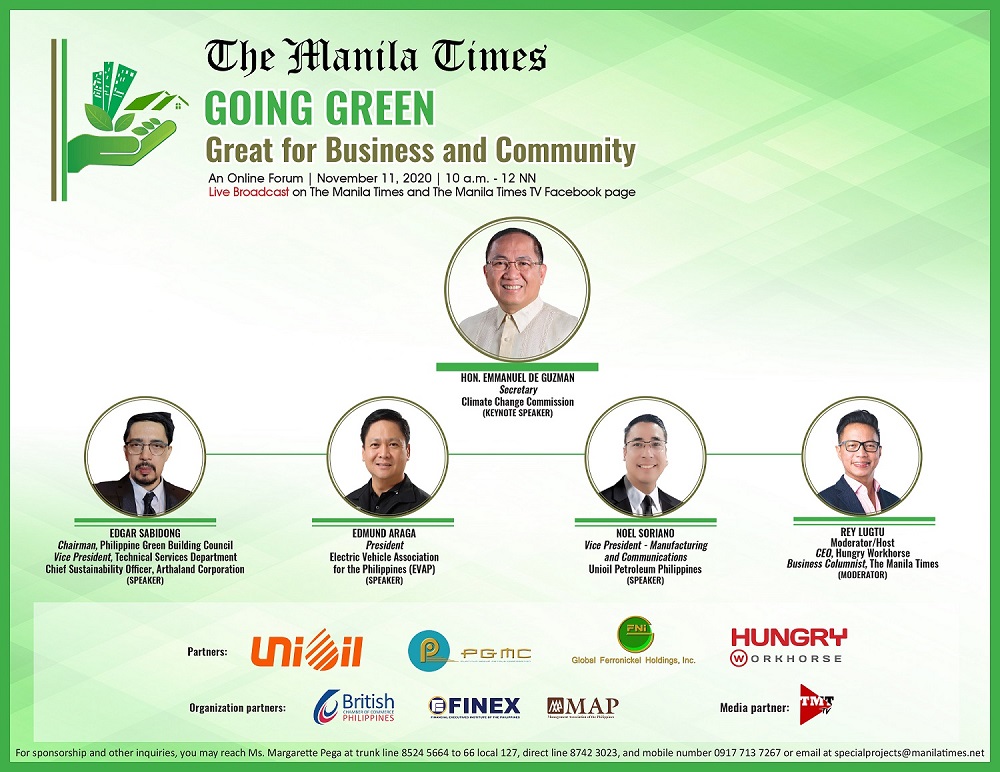
November 12, 2020 Thursday

MANILA, 13 November 2020 — The Climate Change Commission (CCC) calls for increased collaborative work for the government and private business sector in ushering a paradigm shift toward low-carbon and climate-resilient development.
CCC Secretary Emmanuel M. de Guzman said that the climate emergency must inspire radical action both from the public and the private sector, in the same manner as the COVID-19 pandemic response.
“The current Covid-19 pandemic and the prevailing climate emergency are both rooted in the world’s current economic model of pursuing infinite growth at the expense of our planet on which our survival depends,” he said during the Manila Times Virtual Forum held on Wednesday, November 11.
De Guzman cited the recent two powerful typhoons Rolly and Quinta, which left numerous casualties and millions in destroyed crops and infrastructure in the Bicol Region. The recovery and reconstruction efforts in affected areas are put on hold as residents brace for another tropical storm that is projected to further intensify into a typhoon before making landfall
“There is no more time to waste. We must immediately pursue the integration and coherence of private and public sector strategies for climate change adaptation and mitigation, disaster risk reduction, and sustainable development,” De Guzman stressed.
De Guzman stressed the role of international climate negotiations and national policies which mainstream climate change adaptation and mitigation to address the problem of climate change. He said that reducing carbon emissions entails the exponential scaling up of renewable energy systems, energy efficiency, electrification of transport systems, and improvements of industrial and building efficiency on a global scale.
“Despite our country’s insignificant emissions of less than half of one percent of global emissions, the burden of prevalent poverty, and the recurring economic losses from climate change impacts, we are resolved to pursue a low-carbon development pathway,” he affirmed.
De Guzman also mentioned the policy initiatives from the other agencies of the government – such as the sustainability reporting guidelines for publicly listed companies issued by the Securities and Exchange Commission; sustainable finance policy framework approved by the Bangko Sentral ng Pilipinas, and the moratorium on new coal-fired power plants which will be issued by the Department of Energy – which shall be articulated in the country’s first Nationally Determined Contributions or NDC under the Paris Agreement, which is now being developed and finalized through a whole-of-government-and-
“The NDC is the articulation of the country’s investment strategy in pursuit of climate-resilient and low carbon development. It defines also which transformational measures are conditional or contingent on the climate finance support of developed countries,” De Guzman said.
The Secretary also emphasized that the policies, frameworks, and regulations of the government will not be successful without the support and cooperation of the private sector. He enumerated several possible areas of cooperation between the public and the private sector in the pursuit of sustainable and green development – such as promoting risk-informed and science-based development planning; mainstreaming climate change and disaster resilience in the businesses’ investment and operational planning; promoting sustainable urban planning and development; developing and promoting disaster risk financing tools; and social preparations for the low-carbon transition and the exponential transformation of all sectors towards a green economy.
De Guzman mentioned that these climate solutions are now often cheaper and provide greater economic returns than higher-carbon alternatives, opposite from the mistaken assumption before that climate actions are inevitably costly to those that pursue them.
“Such thinking only empowers those who stand to benefit from delay and inaction by propounding the notion that climate action conflicts with critical economic, development, and public welfare priorities. We now know that reality is very much different. What is good for the planet is good for business,” De Guzman said.